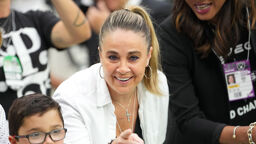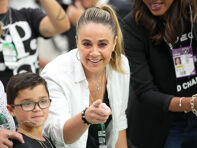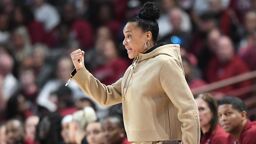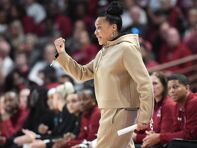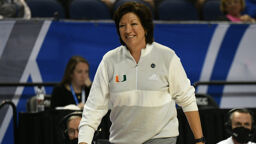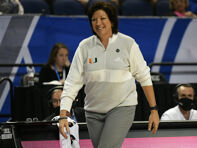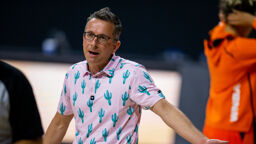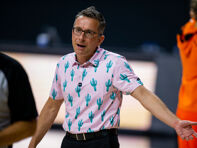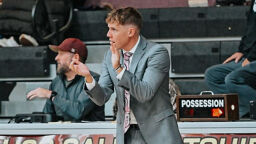Jeremy Fewell waited for his son to get home from kindergarten. Fewell, 32 at the time, had told his wife a few days earlier that he felt their marriage was done, and he was going to leave. The stay-at-home dad waited to leave until his mother-in-law could come to San Antonio to watch their two boys.
He had no income since the family moved to San Antonio a year and a half earlier, so he planned to drive home and stay with his mom near Indianapolis.
He didn't want to leave his sons, but he had to get away.
"One of the worst moments in my life," Fewell said. "I was absolutely suicidal at that point. For me, it was how do I save myself from doing that? … To be blunt, I didn't know if I was still going to be alive [to see them again]."
He knew his support system existed around Indianapolis. He did not know if they would accept him being gay, but they were his best chance.
"If I stay here [in San Antonio], it's going to be more of a hell than if I get home and have at least a baseline support cast," Fewell said.
He left that afternoon and started the 17-hour drive to Indianapolis.
Indoctrination
Fewell grew up in Kokomo, Indiana, where a young Ryan White years ago died from AIDS. Though White contracted AIDS through a blood transfusion, the boy spoke during his battle with the disease about the vitriol toward a kid with the disease known in the early 1980s as gay cancer.
"My school locker was vandalized inside and folders were marked FAG and other obscenities," Ryan White testified in Washington, D.C., during a 1988 hearing on AIDS. "I was not welcome anywhere. People would get up and leave, so they would not have to sit anywhere near me. Even at church, people would not shake my hand."
Fewell, born in 1977, was about six years younger than White, who died in 1990 at the age of 18.
Kokomo, which is about an hour north of Indianapolis with a population of 45,000, became divided by feelings on White.
"The polarization of that led to that I didn't know a single gay person in my high school, period. I didn't know a single gay person in my hometown," Fewell said. "If they were there, they were closeted or kept to themselves so no one knew."
The animosity toward White did not match Fewell's parents' beliefs. He points to his dad regularly watching both "Will & Grace" and "The Golden Girls" and his mom participating in the 1963 March on Washington as indicators of their open-mindedness. Even though he had accepting parents, Fewell felt convinced by society that being different was unacceptable, so he never allowed himself to accept or pursue any same-sex attraction he felt as a young man.
Focused on following what he perceived as a normal man's life, Fewell married the woman he met as a 19-year-old student at Purdue University. She was the second person he ever dated after dating one girl throughout high school. He graduated from Purdue in May 2001 and got married that same month.
"It was the natural progression of life as I saw it, and I did enjoy the person I married," Fewell said.
Fewell started working, initially for the city of Kokomo, and his wife attended medical school in Indianapolis. Fewell, who swam from grade school through high school, also coached club and high school swimming.
In 2007, married with two kids, Fewell took a position with the school district in Tipton, Indiana, to run its aquatic center and coach the high school and middle school swim teams. Logan Maddox was a freshman swimmer in 2007-08.
"He is a tough dude no matter what when we were in that pool," Maddox said. "He was always pushing us."
Occasionally, Fewell brought his sons to a practice.
"Practice seemed a little easier that day," Maddox said. "He'd be coaching us, but his kids would walk around and he'd mess with them somehow and pick them up. He just seemed glad to have his kids with him. He paid attention to them quite a bit when they were there."
Fewell spent one season coaching Tipton before his wife, who had finished medical school and became a military doctor, received the assignment to work at Brooke Army Medical Center in San Antonio. The family moved there in summer 2008.
With his wife now working full-time as a doctor, Fewell became a stay-at-home dad, and he didn't enjoy it. After 30 years living in central Indiana, he now lived in south Texas and knew no one. His daily interaction was limited to two boys less than 6 years old.
Fewell and his wife grew apart and started sleeping in separate beds. Time with his sons lost its enjoyment. Unhappiness forced him to question if he needed to confront his secret same-sex attraction.
Exploration
In the summer of 2009, Fewell made a trip to Indianapolis for a few weeks to see family and friends. Part of the trip was a Dave Matthews Band concert with friends.
Fewell expected they would go to some bars in Indianapolis after the concert, but his friends decided to end the night when the music stopped. Fewell wasn't ready to head home, so with this opportunity to go to a bar alone, he decided to visit a gay bar for the first time.
He felt his heartbeat hasten and breaths quickened. There were no women in the bar and a dancefloor full of guys. Fewell bought a beer and leaned his 5-foot-11, 178-pound frame against a wall.
Fewell said seeing "a bunch of men gyrating on each other" made him think, "I would like to be them, but I don't think I'm supposed to be them."
A few weeks later, he returned to his wife and sons in San Antonio, but the respite in Indianapolis solved nothing. Fewell's hatred for his life grew, and so did his depression.
It was then that Fewell moved back to Indiana. Brad Phifer, a friend in Indianapolis, offered him a place to stay until he found a job. Living in Indianapolis, Fewell started visiting gay bars and meeting other gay men, which slowly helped him see being gay as normal.
In March 2010 after eight years of marriage, he finalized his divorced, and that spring, he started seeing the man who would be his first serious relationship. His partner was 19 and the relationship lasted 18 months.
"People who come out later in life, if they come out when they're 28 or 30, they're going through their 21-year-old period in terms of being gay at that time frame," Phifer said. "Maybe it's one of those things, when he first came out, he related to 18 year olds and 20 year olds."
When Fewell started the relationship, he had yet to tell any of his straight friends that he now identified as gay. By that fall, he felt forced to tell his family and close friends when a female high school classmate sent him an email that she heard he is gay. His family expressed no qualms about his sexuality, and it helped them understand his divorce.
However, Fewell had not told his ex-wife that he identified as gay. In the two years after leaving San Antonio, Fewell said he saw his sons twice. He rationalized that he didn't have the money to travel to San Antonio and still dreaded the repercussions of being gay.
"One of my fears was if my kids find out I'm gay, they'll never talk to me again and their mother won't let me around them," Fewell said.
His ex-wife forced a conversation about his sexuality in the fall of 2011. Fewell said the conversation went well, and she welcomed him returning to San Antonio to have shared custody. Fewell started applying for jobs in San Antonio, saved money to move there, and made quarterly trips to see his sons. After three years without finding a full-time job, he accepted a part-time lifeguard position and had saved enough money to sustain himself for a few months while looking for full-time work.
Lone Star
Fewell moved to San Antonio in December 2014. On his last trip to visit his sons before the move, his older son asked why he left five years earlier.
"I should have never done that, and I'm sorry," Fewell said. "Your Dad made a mistake, but I'm here now."
In May 2015, Fewell accepted a full-time job working for the University of Texas-San Antonio, a member of Conference USA. Fewell now works as an athletic certification specialist, which means he checks that UTSA athletes comply with NCAA admission and academic requirements.
"The people I work with are phenomenal," Fewell said. "They're just good, grounded people that are fun to be around and fun to talk to. That's probably my favorite thing about UTSA."
Fewell also started coaching club swimming in San Antonio shortly after he returned. It marked his first time coaching competitive swimming in more than six years.
Fewell, who turns 39 in July, said the biggest regret of his life are those five years he missed with his sons. Though he feels he needed to accept himself and gain confidence in his sexuality, he wishes he never left San Antonio.
But in those years away, he found personal happiness, and he now shares that happiness with his sons.
"I love every minute I spend with them," Fewell said. "For me, I still feel guilty about the time I missed, and I will always feel guilty about that. You can't make up for lost time. I'm going to make the best of the time I have with them now."
Jeremy Fewell is an athletic certification specialist at the University of Texas-San Antonio. He can be reached by email at [email protected] or on Facebook or via Instagram @fuelj.
Erik Hall is a member of the Associated Press Sports Editors. He can be reached by email at [email protected] or through Twitter @HallErik.



